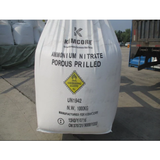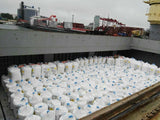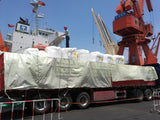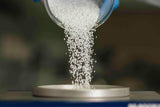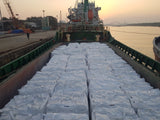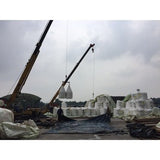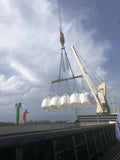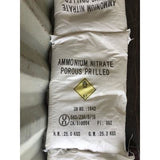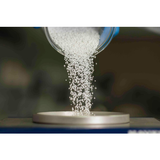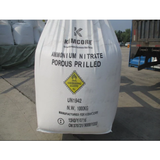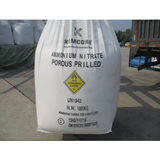Porous Prill Ammonium Nitrate (PPAN) ANFO Grade 99%
Porous Prill Ammonium Nitrate, also known as Low-Density Ammonium Nitrate (LDAN) is one of the most popular and economically-priced blasting chemicals available to the mining industry. Ammonium Nitrate is the most widely used component because it is an excellent oxidizer. Kemcore supplies ammonium nitrate porous prills that are ready to absorb more than 8% oil. This highly-porous explosive grade ammonium nitrate mixes into a uniform ANFO on-site and offers enhanced flowability and handling.
WHAT KEMCORE PROVIDES AS A PARTNER?
Reliable Supply
KEMCORE is always prepared to fulfill orders as they're placed and deliver the product customers need.
Commitment to Safety
KEMCORE has been safely and responsibly distributing Porous Prill Ammonium Nitrate (PPAN) for decades and continues to make advancements through improved packaging options, on-site unloading services, and comprehensive training for our customers.
Dedicated Support
Whether it’s assisting with Porous Prill Ammonium Nitrate (PPAN) handling or regulatory needs like licensing, permitting, and compliance monitoring, support is available.
COUNTRY OF ORIGIN
- China
SYNONYMS
Ammonium Nitrate, Ammonium nitrate-15N, Prilled Ammonium Nitrate, Porous Prill Ammonium Nitrate, PPAN, AN-PP, Low-Density Ammonium Nitrate, LDAN.
Physical Properties
Appearance: White crystals, odorless, hygroscopic, deliquescent.
Form: White hygroscopic crystals, Transparent, hygroscopic, deliquescent crystals or white granules/prills
Odor: Odorless
Boiling point: 210℃
Melting/freezing point: 169℃
Specific gravity: 1.725
Flashpoint: 210°C
Molecular Formula: H4N2O3
CAS Number: 6484-52-2
Explosive Grade AN Porous Prills for Civil Explosives
- Specifically designed for mining and blasting industry use
- Create uniform ANFO when mixed with fuel
- Non-caking formula with low moisture content agglomerates easily and won’t set
- Low particle density promotes even absorption of fuel for improved detonation
- Good friability, low clay content, and non-caking consistency ensure consistent results
- Ideal prill size distribution for blasting (6-20 mesh)
Lightly-Coated Ammonium Nitrate Prills
The AN-PP Kemcore supplies are ideal for civil engineering and explosives manufacture as well as open cut coal and metal, underground, and quarry mining. Kemcore’s Ammonium Nitrate is specifically designed to be used as an emulsion explosive base in ANFO, WR ANFO, Heavy ANFO emulsion, and water-gels.
Read more about our recent shipment to Australia here...
Very stable in emulsion mixtures, our AN-PP is free-flowing, non-caking, and easy to agglomerate, but won’t set. With ammonium nitrate content of greater than 99% and a high oil absorption rate, our porous prills create superior detonations. They also offer excellent resistance to friability and high compressive strength.
Are You Spending Too Much on Blasting Chemicals?
Explosives are among the top 15 expense items for many mining companies. Ammonium nitrate is one of the most expensive chemical components of emulsion-based bulk explosives and if it’s blocky, lumps, and cakes, you’re in trouble. Our AN-PP is lightly coated with an anticaking agent to prevent it from caking, thermocycling, collecting dust, or gathering moisture through condensation.
You can’t afford blocked pump hoses and you shouldn’t have to pay more to get reliably high-quality ammonium nitrate PP. That’s why Kemcore negotiates with multiple, reliable, and ISO-certified Chinese suppliers for you. We only work with reliable suppliers who use French KT patented technology and we regularly inspect supplier facilities to make certain the end product meets our standards, is non-caking, readily absorbent, and flows freely.
Our careful selection and inspection process guarantees that you obtain the highest quality and purity ammonium nitrate porous prills for the best price. Kemcore’s end-to-end logistics delivers the mining chemicals you need directly to your site. On-time delivery, consistent quality, and reliable suppliers make Kemcore’s AN-PP the choice of companies in more than 30 mining regions around the globe.
Synonyms: Glacial acetic acid; Acetic acid solution; acetic acid 50%; acetic acid, of a concentration of more than 10 per cent, by weight, of acetic acid; Acetic Acid Glacial BP; Natural Acetic Acid; Acetic acid (36%); Acetic acid, food grade; Acetic Acid Glacial; GAA; Acetic Acid, Glacial
It is a colourless liquid that when undiluted is also called glacial acetic acid. It has a distinctive sour taste and pungent smell.
Acetic acid uses: Additive in industrial explosives in Mining.
Other uses include use of acetic acid in the production of vinyl acetate monomer, acetic anhydride and ester production.
Chemical gassing agents -In the case of emulsion explosives, using Acetic acid can accelerate the gassing process. The chemically gassed emulsions may take 40 – 50 minutes for completion of gassing within the blast holes, particularly when the emulsion is colder.
In cases where acetic acid is used, it is added to the emulsion prior to gassing, the desired amount of acid is mixed in the emulsion, before adding the gasser.
A gassing solution comprising sodium nitrite in water together with the selected enol compound and acetic acid is introduced into the emulsion explosive at the blast hole by entraining the gassing solution into a stream of the emulsion explosive using pumps.
The solution pH is an important parameter in the gassing of emulsion explosives due to the high cost associated with acid addition therefore a pH value should preferably be maintained at 4.1 or below.
|
Identifiers |
|
|
Abbreviations |
AcOH |
|
CAS number |
64-19-7 |
|
PubChem |
176 |
|
ChemSpider |
171 |
|
UNII |
Q40Q9N063P |
|
EC number |
200-580-7 |
|
UN number |
2789 |
|
Properties |
|
|
Molecular formula |
C2H4O2 |
|
Molar mass |
60.05 g mol |
|
Appearance |
Colourless liquid |
|
Odor |
Pungent/Vinegar-like |
|
Density |
1.049 g cm |
|
Melting point |
16 to 17 °C; 61 to 62 °F; 289 to 290 K |
|
Boiling point |
118 to 119 °C; 244 to 246 °F; 391 to 392 K |
|
Solubility inwater |
Miscible |
|
Acidity (pKa) |
4.76 |
|
Basicity (pKb) |
9.198 (basicity of acetate ion) |
|
Refractive index(nD) |
1.371 |
|
Viscosity |
1.22 mPa s |
|
Dipole moment |
1.74 D |
1- TRANSPORT INFORMATION
- Transport-UN 2789
- Hazard Class No. : 8
- Packing Group: II
- H.S. Code: 2915211900
2- STORAGE & HANDLING
- Stable at room temperature in closed containers under normal STORAGE & HANDLING and handling conditions. Refer to SDS sheet
3- PACKING
|
Packing type |
Tons/FCL |
|
IBC Drums |
18tons/FCL |
|
30kg Drums |
21tons/FCL |
|
200Kg drums |
16tons/FCL |
4.Environmental impact
- Acetic acid biodegrades readily under both aerobic and anaerobic conditions.
- Acetic acid does not absorb light with wavelengths >290 nm(4), and is not expected to be susceptible to direct photolysis by sunlight(SRC).
- Incase of spillage neutralize spill with soda ash or lime.
5. Download our Acetic acid msds for more handling information.












